The kiss between the young man and woman was sweet – a friendly peck, really. But it didn’t sound right. Needed more smack. The actors weren’t around anymore; filming had wrapped up months ago, and they’d flown to other movie sets. No problem: Sound editor Mark Menza pushed up his sleeve, leaned into a microphone, and kissed the inside of his forearm,getting just the right smooching sound.
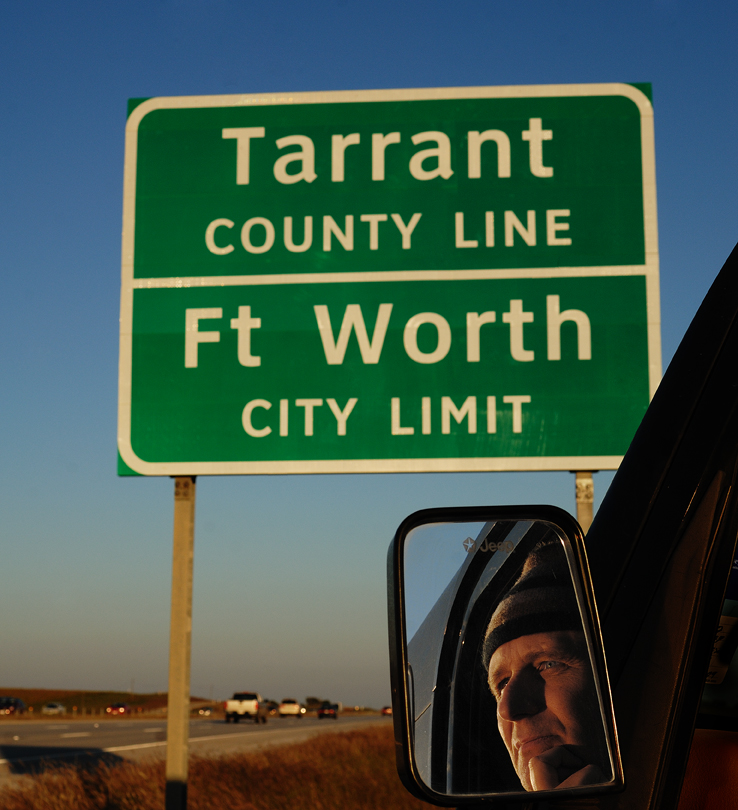 “I don’t know if anybody needs to know that,” he said about the scene in Fort Worth filmmaker Tom Huckabee’s latest movie, Carried Away.
“I don’t know if anybody needs to know that,” he said about the scene in Fort Worth filmmaker Tom Huckabee’s latest movie, Carried Away.
Menza and Huckabee were at the tail end of an eight-hour mixing session, meticulously looping dialogue and adding hundreds of other sound effects – footsteps, wind, car doors – to the audio track. Every second of film requires many minutes, sometimes hours, of work to get the sound just right. It’s one of the last steps in a movie’s long production process, so Huckabee was thrilled to kill a gorgeous Sunday holed up in a dark studio. It meant he was one step closer to reaching a goal.
Carried Away is a dream project, the movie he always wanted to make during his long Hollywood career. But La La Land can be a callous temptress, stringing people and their projects along for years before dropping them cold. Huckabee spent most of his time working on other people’s projects and overlooked his own aspirations along the way.
“Tom has always been a booster for other people’s art,” said actor and director Bill Paxton, who grew up in Fort Worth and made amateur films with Huckabee before finding fame in Apollo 13, Twister, Mighty Joe Young, and, currently, HBO’s Big Love.
“Tom was a huge advocate for me,” he said. “I’ve gone to the bank with his genius. I’ve never seen anybody with so much loyalty.”
In turn, Paxton’s own loyalty led him to work alongside artistic director Huckabee at Fort Worth’s inaugural Lone Star International Film Festival in 2007 – and that same loyalty made Paxton shun the festival after his friend was fired. Huckabee said he was shocked by his dismissal and “hadn’t seen it coming” but refuses to diss the festival or the board members who shoved him out the door. He’s moved on.
A heaping helping of personal tragedy has left him thoughtful and grounded in his mid-50s. He watched his wife of 23 years die after a long, debilitating illness. Barbara Cohen followed him from Austin to Hollywood, married him in 1983, and flourished as a successful casting director before breast cancer tortured her for years, then stole her away completely in 2006.
“I don’t fret about small stuff like I used to,” Huckabee said. “I feel like nothing else in my life can be as bad as that. She had a horrible death. I’ve never seen suffering like that – mental, emotional, physical.”
Their Hollywood house didn’t feel like home afterward. So when Huckabee’s mother died in Fort Worth six months later, he moved back to his hometown to help his siblings look after their father, who has Alzheimer’s.
Before long, Huckabee decided to do something in Fort Worth that had eluded him for a quarter century in Hollywood – write and direct an independently financed feature film using a local cast and crew. He poured his life savings and proceeds from the sale of his Hollywood home into Carried Away‘s $275,000 production costs, betting on himself to make it triumphant and profitable. The movie might be described as Harold and Maude meets Rain Man, with plenty of local footage included in a road-trip flick whose action stretches from Fort Worth to California.
Huckabee is submitting Carried Away to film festivals and anticipates a release in limited theaters and on DVD. Meanwhile, he’s planning a local exhibition of his digital paintings next year in Fort Worth and is dipping his toe somewhat awkwardly into the dating pool.
The role of the returning prodigal son is one that fits Huckabee comfortably these days. Life is good. Making the movie was the perfect antidote for what had been a very tough decade.
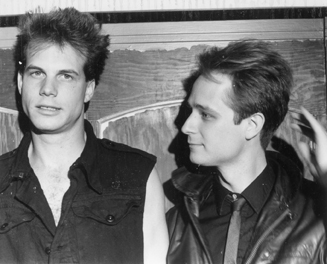 As he put the final touches on the sound edits, Huckabee said something about his movie that rings true for his life in general.
As he put the final touches on the sound edits, Huckabee said something about his movie that rings true for his life in general.
“It’s like building a Lego castle – one piece at a time.”
A frantic woman and her shady-looking accomplice grab Jim Morrison’s feet and drag him across the floor toward a bathtub. They’d spiked his drink with poison, and the Doors frontman had writhed in agony before dying on the floor.
Suddenly the scene flutters. The vintage VCR sitting on the floor of Huckabee’s cluttered living room floor had been providing an impromptu theater venue, and we were watching the first movie he made while attending the University of Texas at Austin’s film school in the late 1970s. The murder scene in The Death of Jim Morrison diverges greatly from popular theories surrounding the singer’s death, and the movie angered Doors insiders after Huckabee sent them copies, trying to secure music rights for a soundtrack.
Huckabee was recalling a tense exchange from that time when the tape began to stutter and then froze up completely, as if the Lizard King’s ghost had intervened.
Causing shock and anger was par for the course with some of Huckabee’s early movies. Pushing people’s buttons made life interesting.
Wedgewood Middle School in the late 1960s wasn’t exactly a mecca for budding filmmakers, but Huckabee was hooked after he discovered a 16mm Bell & Howell movie camera in his father’s closet. He and a school chum decided to make movie magic. “It still had film in it,” Huckabee said. “We went and shot it and then got it developed.”
His father had used the camera only twice in a decade, and the first part of the developed film showed footage of Huckabee as a 4-year-old opening Christmas presents. The earlier footage had remained in the camera so long that the images were faded. The film developer thought he’d made a mistake and offered Huckabee some free film. Huckabee and his buddy used the free film to shoot a Western tale of poker players, card cheating, and murder.
“We read the manual wrong and set the exposure wrong, and it came out black,” he said. “But it gave me an identity. I was the guy who made movies.”
As a Southwest High School sophomore he directed Into the Light, about teenagers struggling with religious faith, and submitted it to a Texas Christian University film festival. That spring, he and 25 other local students enrolled in a program to study abroad for a semester in England. On the plane ride there he met an older student from Arlington Heights High School named Bill Paxton.
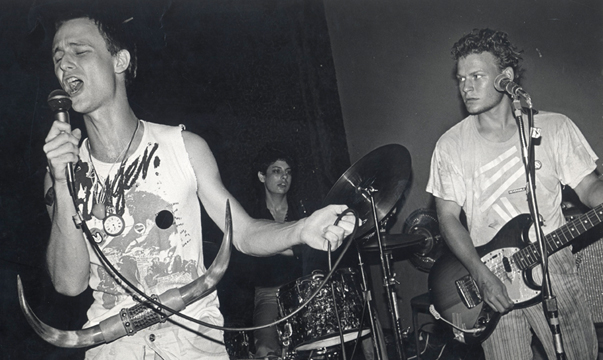 “While we were in England I received a letter saying I’d won first place at the TCU film festival, and Bill was impressed by that,” Huckabee recalled.
“While we were in England I received a letter saying I’d won first place at the TCU film festival, and Bill was impressed by that,” Huckabee recalled.
Paxton had been experimenting with homemade movies himself and vowed to hook up with Huckabee back in Fort Worth. In the summer of 1974, they pooled $300 to buy a cutting-edge Kodak Ektasound movie camera, the first Super 8 with sound. “We went crazy with that camera,” Huckabee said.
Others went crazy when they saw the finished products. The pair’s early movies were usually loved or loathed at public screenings at clubs and film festivals. Huckabee’s love of foreign directors such as Federico Fellini, combined with Paxton’s infatuation with action films and silent movies, led to a jarring cross-pollination of styles – literate, violent, visual, abrasive, and fantastical.
For one early movie, they borrowed a huge swastika banner, rifles, bayonets, and German helmets that their friends’ fathers, World War II vets, had brought home from overseas. Victory at Auschwitz depicted an American soldier trying to save Jews aboard a train bound for a concentration camp. The railroad yard near Vickery Boulevard was the perfect substitute for a German depot.
“We hung a big Nazi banner on the side of a boxcar,” Paxton said. “We had guns and uniforms and helmets.”
Filming stopped when three police cars arrived.
“The police leveled their guns at us and told to throw down our guns,” Huckabee said.
As usual, the fledgling filmmakers hadn’t bothered to get permission to film, so police were baffled when passersby reported neo-Nazis planning an armed uprising. A policeman told Huckabee that if any of the boys had raised their guns they all might have been gunned down for real.
Once Paxton graduated, he lit out for Hollywood. Huckabee was stuck in high school for another year but joined his friend on the West Coast after graduation. They lived together until Paxton got a film job that took him out of town for a year. Alone and homesick, Huckabee moved to Austin and enrolled at UT’s film school, where he met his future wife, an outgoing and dynamic knockout named Barbara Cohen.
His first student movie was the Morrison short, and its drugs, violence, and nudity caused some people to grumble at the school’s annual student film screenings. “It started a big problem,” Huckabee said. The faculty became divided over whether to censor sex and violence from future student projects.
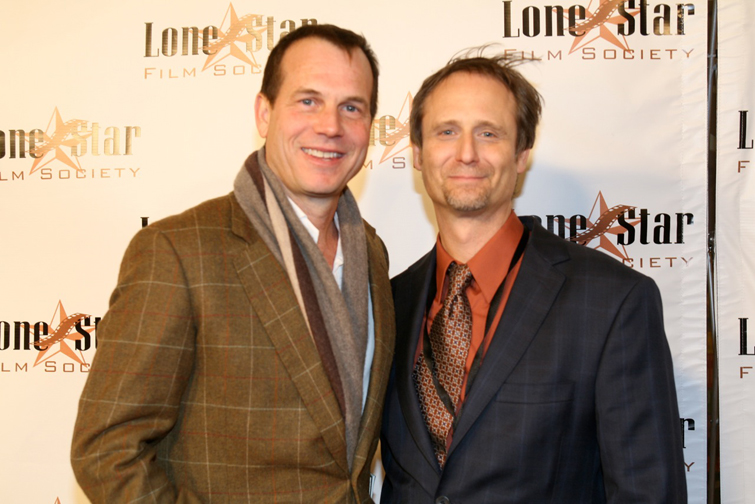 Later, when he sent the film to Elektra Records president Jac Holzman seeking rights to use the Doors music, he received a reply that wasted no time getting to the point. “I watched what I could of the Jim Morrison tape, but my experience of Jim was so personal and the implications contained in the early portion of the tape that Jim may have been willfully murdered so outlandish that I ceased viewing the material at the point where you dumped him in the bathtub,” Holzman wrote, adding that the film was “exploitive under a veneer of significance.”
Later, when he sent the film to Elektra Records president Jac Holzman seeking rights to use the Doors music, he received a reply that wasted no time getting to the point. “I watched what I could of the Jim Morrison tape, but my experience of Jim was so personal and the implications contained in the early portion of the tape that Jim may have been willfully murdered so outlandish that I ceased viewing the material at the point where you dumped him in the bathtub,” Holzman wrote, adding that the film was “exploitive under a veneer of significance.”
John Burnett, now a National Public Radio correspondent, was Huckabee’s roommate when the Morrison movie was in the works, and he quickly learned to expect the outrageous. He recalled coming home from class one day to find the kitchen ransacked and a nude scene being filmed.
“This friend of ours, Sally, and the male actor who played Jim Morrison were on the floor of the kitchen and they had the refrigerator door open and they had pulled out everything, the milk, the ketchup, eggs, tortillas, everything, and had made a slurry on the floor and they were in an amorous embrace and covered in this stuff, and Tom was kind of demonically filming all of it,” he said.
Huckabee was possessed, Burnett said. “He always thought about movie-making in a completely original way,” he said. “A bird flew in the apartment one time and couldn’t get out. Tom immediately grabbed a camera and started following the bird around the apartment yelling ‘Tweet for Tom, tweet for Tom.'”
Another time Huckabee filmed a girl dancing naked and then projected it from the balcony of their apartment onto a white concrete wall for everyone to see.
“He was enormously entertaining,” Burnett said.
Punk rock was shrieking its way across America at the time, and Huckabee began drumming for the Austin-based Huns, a fledgling punk group in a city with only one punk club. Raul’s opened on Guadalupe Street in 1978, and the Huns were among the first handful of punkers to play there. The band’s debut performance included profanity and mock violence. Austin police raided the club during the song “Eat Death Scum” and arrested a half dozen people, including lead singer Phil Tolstead, which made front-page news in The Daily Texan, brought national attention to Raul’s, and got the Huns a write-up in Rolling Stone, thus cementing the band’s place in Texas punk history.
The Texan quoted a tongue-in-cheek Huckabee as saying, “I saw a cop walk onstage, and I couldn’t believe it – we said on the posters, ‘No Police.’ “
For his final school project, Huckabee took footage from a movie Paxton had never finished and began adding new scenes and editing old ones. Three years passed, and he was still working on the film when UT gave him a diploma and bade him farewell.
“I was trying not to graduate so I could keep using their facilities,” he said.
Huckabee returned to Hollywood, determined to finish transforming Taking Tiger Mountain into a full-length feature. Horizon Films contracted to distribute the movie, which appeared in art theaters and film festivals to mixed reviews.
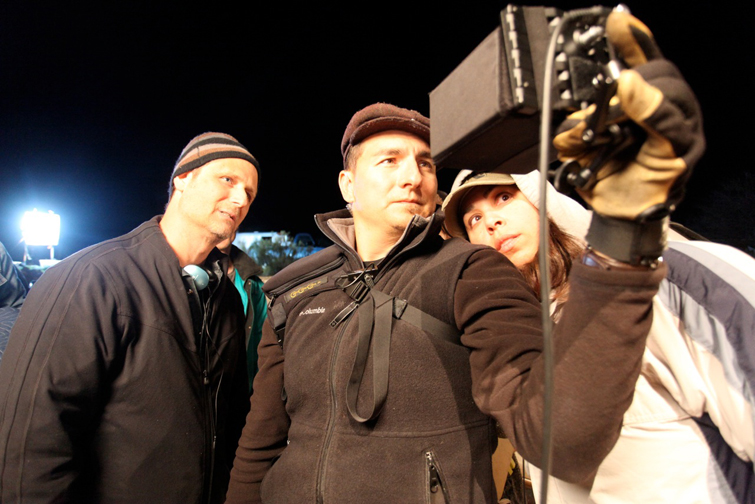 Next he was hired to direct film festivals for the Landmark theater chain. But by 1984, chronic pain from scoliosis forced him to take time off to convalesce, and he turned his attention to the more sedentary art of script writing.
Next he was hired to direct film festivals for the Landmark theater chain. But by 1984, chronic pain from scoliosis forced him to take time off to convalesce, and he turned his attention to the more sedentary art of script writing.
“I became obsessed with the theories of dramatic writing,” he said.
Throughout the 1980s and ’90s he studied literature and the art of storytelling. He rewrote scripts for others by day while working on his own screenplays at night. Some of his stories got nibbles of interest and came close to being made into movies. But no cigar. “I had a lot of those projects that took a lot of time and almost got made but didn’t,” he said.
In the meantime, he helped friends with their projects. Huckabee and Paxton started American Entertainment Co. as a clearinghouse for film projects, and Huckabee recommended the script that would become Paxton’s directorial debut in 2001, the psychological thriller Frailty, which earned rave reviews.
“Tom said, ‘This is the one you’ve been looking for,’ ” Paxton recalled. “He was my brain trust. Tom’s genius is in his analytic ability to break down a screenplay and themes and tell you what’s working and what isn’t. He did so much script doctoring, you have no idea.”
The idea of following her soon-to-be husband to Hollywood hadn’t scared Barbara Cohen. She figured she’d be successful no matter where they went. Selling clothes at Neiman Marcus helped pay the rent for a while, but she had bigger plans. The film industry appealed to her as well, and she had a knack for winning over people. Her dynamism played well against Huckabee’s more internal nature.
“She was a great lady,” Paxton said. “She looked a little like Susan Sarandon. Beautiful. She was a mover and shaker and organizer, and I think she supplied that part of life that Tom wasn’t as great at, the organizational part.”
Her husband blanched when she decided to become a Hollywood agent.
“I hated agents, and I didn’t like the idea of her being in the same business as me,” he said.
True to form, she landed a job at one of the top agencies as an assistant to a vice president – and learned how tough Hollywood can be. “She came home crying every night because of the abuse from her boss,” Huckabee said.
She quit her job after her boss threw a paperweight at her head, but then she discovered her true calling – casting actors in movies. She worked at Disney and elsewhere before forming her own casting agency with Mary Gail Artz. “They had a meteoric rise,” Huckabee said.
Captain Ron, Rushmore, The Nightmare Before Christmas, and I Am Sam were among the many movies she cast, including two of Paxton’s directorial projects, Frailty and The Greatest Game Ever Played.
“Tom and Barbara were one of the few couples I know who had really weathered the storms in Hollywood,” Paxton said.
Breast cancer was a storm that arose in 1998 and lingered for eight years until finally taking Cohen’s life.
Huckabee was floored by his loss and discouraged by the Hollywood grind, particularly after another pet project fell through. His mother’s death and his father’s slide into dementia were enough to pull him back to his hometown.
“I thought it was time to get out of the movie business,” he said.
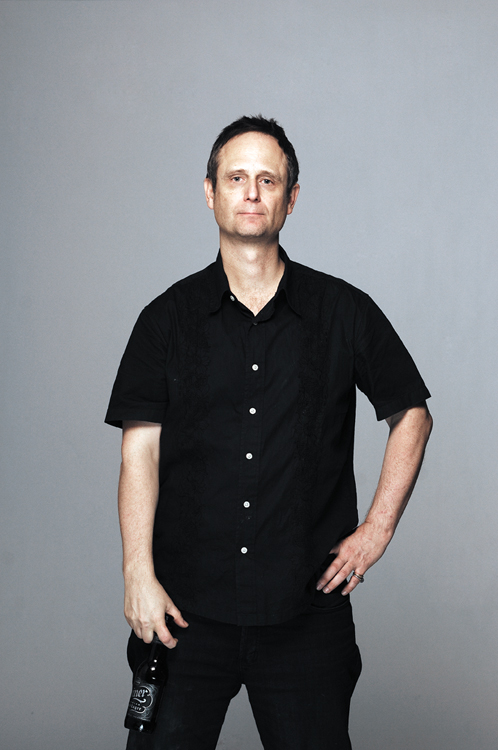 While caring for his wife he’d begun photographing flowers floating in water and, in typical fashion, became obsessed with his new passion. Looking back, he realized that the thousands of images he’d made reflected his wife’s painful battle. Early photos showed colorful flowers in full bloom lying atop bright blue water. In later images, flowers were more often wilted and brown, the watery backgrounds dark and ominous. The photos were featured last year and earlier this year at exhibits in Fort Worth, Dallas, Commerce, and Santa Monica.
While caring for his wife he’d begun photographing flowers floating in water and, in typical fashion, became obsessed with his new passion. Looking back, he realized that the thousands of images he’d made reflected his wife’s painful battle. Early photos showed colorful flowers in full bloom lying atop bright blue water. In later images, flowers were more often wilted and brown, the watery backgrounds dark and ominous. The photos were featured last year and earlier this year at exhibits in Fort Worth, Dallas, Commerce, and Santa Monica.
Huckabee was living with his father in Edgecliff when the Lone Star Film Society, at Paxton’s urging, offered Huckabee a job as artistic director at its first film festival. Films selected by Huckabee were interesting, offbeat, and praiseworthy, and the number of celebrities converging on Fort Worth was a coup for a first-time festival in a city not known for its film community. Paxton, Harry Dean Stanton, Martin Sheen, Keith Carradine, Robert Rodriguez, T-Bone Burnett, and Fred Durst were among those roaming Sundance Square in November 2007 for four days of movie screenings, panel discussions, and partying.
Many people were surprised when the film society’s board of directors dumped Huckabee after first lauding him for pulling together such a splendid festival on short notice and with little money. The board was factious, and when Huckabee tried to keep one faction happy, he’d piss off another. In the end, his head rolled.
Paxton, Fort Worth’s biggest Hollywood connection, was appalled. He stepped down as chairman of the film society’s advisory board. “Tom was maligned in that situation, but I don’t want to stir that up again,” he said.
But Paxton can’t help himself. Seeing his longtime friend mistreated continues to stick in the actor’s craw. “I was very angry at the time,” Paxton said. “It was quite a little festival, and I don’t think they quite knew what we had created for them. Tom is more of a bohemian and artist, and they were looking for more of a politician to run that thing.”
A former film society board member, who asked for anonymity, said Huckabee’s situation was mishandled, and his firing an unfortunate miscommunication. Board members thought Huckabee did a wonderful job of attracting interesting films and high-profile celebrities but displayed organizational shortcomings. The board wanted Huckabee as artistic director but decided to hire someone else to take the lead role as business manager. A board representative met with Huckabee to discuss the situation, but the meeting didn’t go well.
“Tom felt like he was being let go when he really wasn’t,” the former board member said. “I was upset because some of the most talented, creative people I’ve ever worked with lacked in organizational skills, but you build around that. Everybody will say that Tom was instrumental in helping us get off the ground.”
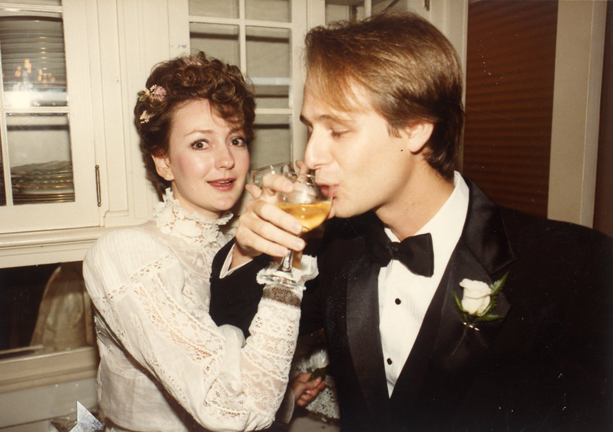 In the end, Huckabee’s dismissal might have turned out for the best because it freed him to pursue his real dream.
In the end, Huckabee’s dismissal might have turned out for the best because it freed him to pursue his real dream.
“We’ve both moved on from that,” Paxton said. “Tom and I are very proud of Fort Worth and the cultural heritage the town has. We still love Fort Worth.”
Huckabee’s hurt feelings didn’t deter him from attending the next year’s festival, where the vampire comedy Night Crawlers impressed him. At a party, he befriended the cast and crew, including one of the film’s stars, Gabriel Horn of Cleburne. They discussed Huckabee’s dream of filming a semi-biographical family drama on a limited budget using local cast and crew. The movie involves a Hollywood actor returning to Fort Worth to break into a nursing facility and free his grandmother. The parallel to Huckabee’s personal situation is obvious.
“It was Gabe who lit the fuse of Carried Away by reading the script and saying he wanted to star in it and help find the financing,” Huckabee said. “It was his enthusiasm for the project that caused me to commit all the money from the sale of my house in Los Angeles.”
Horn, currently in pre-production for his debut as a feature film director in a movie starring Cuba Gooding Jr., remains enthusiastic about the prospects for Carried Away.
“Tom knows the festival circuit inside out,” he said. “He’s already started entering it into major festivals. That’s the first step. It will have a great festival run. The film is touching enough and quirky enough that it’s bound to win some festival awards and warrant a limited theatrical release or a DVD release.”
Horn plays Ed, the lead character who rescues his grandmother from a nursing home and takes her on a road trip despite her Alzheimer’s. Horn and his wife, Jennifer Floyd, share producer credits on Carried Away, meaning they helped pay for the film. Friends and family also invested small amounts. But Huckabee paid about 90 percent of the $275,000 price tag, sinking his life savings into the movie and stretching his credit as well. Finding a distributor to get his movie to the public where it can earn some money is crucial to getting a return on his investment.
He’s got his sales pitch down flat: Movies do great during recessions. There will be a dearth of film product next year because of the recent credit freeze. Investing in a movie might be safer and more profitable today than traditional stocks and bonds. And even if the investment doesn’t pay off, “at least you get a movie when you’re done,” he said.
“If you get lucky and the film turns a profit, you’re a genius,” he said. “If it fails you’re an art patron!”
Huckabee is planning an offbeat method to recoup some of his investment: He’ll auction the title of executive producer to the highest bidder on eBay, with a starting bid of $10,000. He needs about $85,000 to pay off his debts and raise enough money to submit the movie to various festivals, and he hopes to find an executive producer with faith in the film and money to invest.
Horn said the low-budget movie was shot so well that it looks like a million-dollar production and is testament to Huckabee’s directing talent. He expects Carried Away to be the first of many Huckabee projects filmed in
North Texas.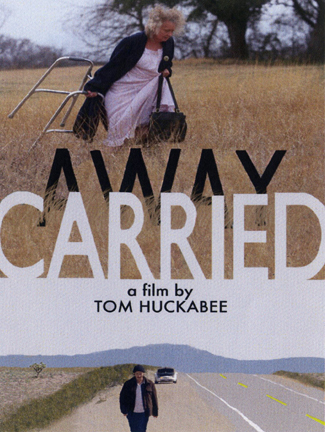
“There’s a lot more freedom when you’re not around the [Hollywood] machine,” Horn said. “It was a roll of the dice making Carried Away. Tom and all of us put in a lot and sacrificed quite a bit, but if and when it pays off, it will pay off big. We are all rooting for the next quirky adventure Tom allows us to be a part of.”
Promoting a movie in a competitive market and a tight economy won’t be easy. Finding a distributor for low-budget indie flicks is always a challenge, although it can be much easier with some festival awards on the mantel.
“This is a perfect festival film, very audience-friendly, and a crowd pleaser,” said James M. Johnston, recipient of Fort Worth Weekly‘s 2009 Best Of Award for filmmaking and a producer on
Carried Away.
“It’s good counter-programming for some of the highbrow art movies that play at festivals,” he said. “Everyone has crazy families, and those kinds of films always do well.”
An audience test screening of Carried Away will be at 7 p.m. Sunday at Four Day Weekend Theater, 312 Houston St., and Huckabee will ask audience members to fill out response sheets in exchange for free admission.
“It’s a good opportunity for someone who thinks the movies are on the wrong track to come and make their voice heard,” he said. “They might literally have an effect on the editing of my film.”
So Huckabee continues to work feverishly on the movie, although “work” might be a misnomer. Fort Worth isn’t a bad place to dig in one’s heels, even for a moviemaker. A film industry infrastructure is established here. Once Carried Away is behind him, Huckabee can see making other movies here. He’s in excellent condition after years of Pilates and a vegetarian diet. A laid-back demeanor disguises the fact that he is energetic and driven.
Most of all he’s stoked about being back home and putting the final touches on a deeply personal movie that gives him such pride.
“The last year has been one of the happiest times of my life, making this film,” he said.











